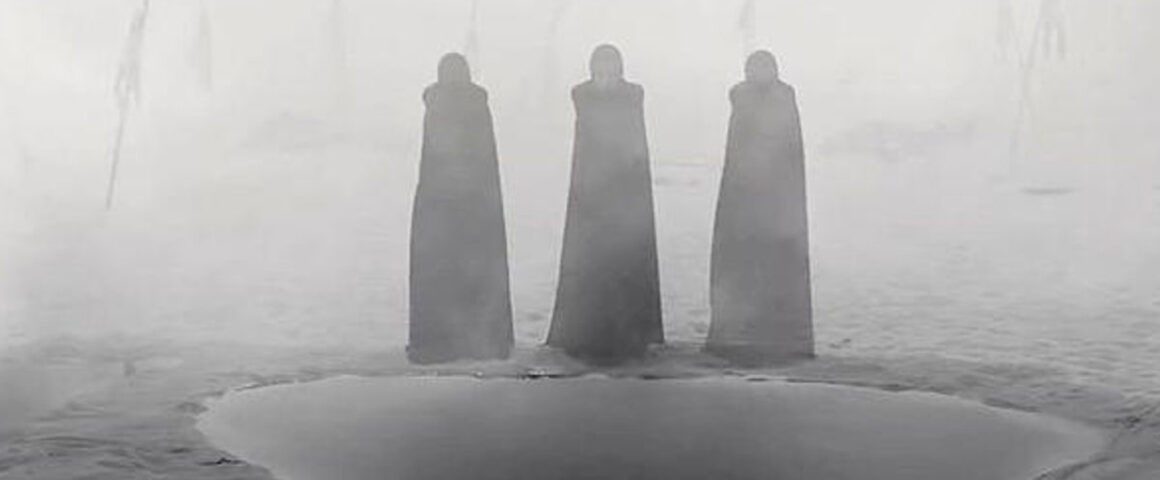“By the pricking of my thumbs, Something wicked this way comes” — Macbeth Act 4, Scene 1
Pronouncements telling us that fair is foul, good is bad, and dark is light are what you might expect to hear from the propaganda machine of an ambitious politician or a news organization seeking to sow confusion. In the opening of Joel Coen’s dreamlike and highly-stylized film, The Tragedy of Macbeth, however, the words “Fair is foul, and foul is fair: / Hover through the fog and filthy air” are proclaimed by three non-political witches (voiced by Kathryn Hunter, “Harry Potter and the Order of the Phoenix”), establishing a mood of brooding tension that evokes the thin line between consensus reality and “the undiscovere’d country from whose bourn no traveller returns” (Hamlet, Act 3, Scene 1)
Based on William Shakespeare’s play “Macbeth,” the witches open the film to a symphony of thunder and lightning. Shot solely on a sound stage by cinematographer Bruno Delbonnel (“Inside Llewyn Davis”) in a boxy 1.33:1 ratio, the film, Coen’s first without his brother Ethan, is stripped down to its essentials without extraneous cinematic embellishments. Stating that “from the very beginning, we weren’t interested in doing a realistic version of the play . . . a rent-a-castle version,” Coen succeeds in conveying the stunning poetry of William Shakespeare but in a conversational rather than a highly dramatic tone.
Towering performances by Denzel Washington (“The Equalizer 2”) as the ambitious Macbeth and Frances McDormand (“Three Billboards Outside Ebbing, Missouri”) as the scheming Lady Macbeth are enhanced by a powerful cast that includes Corey Hawkins (“BlacKkKlansman”) as Macduff, Bertie Carvel (“Les Misérables”) as Banquo, Stephen Root (“Three Christs”) in a farcical scene as a porter, Alex Hassell (“The Isle”) as the “neutral” messenger Ross, and Lucas Barker (“Nightmare Cinema”) as Banquo’s son Fleance, presumably an heir to the throne. Using stark images to create the feeling of a 1940s horror movie, we see leaves bursting through a window, ravens that overtake the screen, the viewer embedded in white fog, cawing black birds, a moon morphing into a spotlight, and Birnam Wood coming to Dunsinane as Malcolm’s soldiers hold tree-branches over their heads.
The “Wyrd Sisters” appear after the Scottish general Macbeth and his associate Banquo have put down a rebellion against King Duncan (Brendan Gleeson, “In the Heart of the Sea”) led by the Thane of Cawdor allied with the king of Norway. After hearing the witches’ claim that the childless Macbeth will become king, and that his friend Banquo will sire a new line of monarchs, Macbeth writes to Lady Macbeth informing her of the prophecies and telling her that he plans to fulfill their predictions even if he must influence the outcome himself. When Duncan decides to spend a night at Macbeth’s castle, a cold and calculating Lady Macbeth convinces her husband to commit murder.
She drugs the King’s servants as Macbeth proclaims to the night sky, “Stars, hide your fires: / Let not light see my black and deep desires.” Fearing that he cannot go too far without losing his humanity (“I dare to all that may become a man: / Who dares do more is none”), Macbeth hesitantly carries out the killing, setting off “dire combustion and confused events / New hatched to th’woeful time.” Early next morning, Macduff, the Thane of Fife discovers the body, while Macbeth murders the servants to tie up loose ends. Fearing for his own life, Duncan’s heir Malcolm (Harry Melling, “The Lost City of Z”) flees to England and Macbeth assumes the throne as the new King.
Eventually, an increasingly paranoid Macbeth becomes a tyrant and a guilt-ridden Lady Macbeth, realizing that “All the perfumes of Arabia will not sweeten this little hand” begins sleepwalking and gradually descends into madness. Casting older actors such as Washington and McDormand as Macbeth and Lady Macbeth allows Coen to suggest that, rather than being motivated solely by unrestrained ambition, they are a middle-aged couple grasping for relevance in their waning years. As Macbeth asserts that life “is a tale / Told by an idiot, full of sound and fury, / Signifying nothing,” he and his Lady are almost sympathetic figures, “strutting and fretting their final hours on the stage.”
Though the darkest of plays attributed to William Shakespeare of Stratford-on-Avon, it is also one of his most popular. While the plays are filled with references to the supernatural and include ghosts, witches, floating daggers, and prophetic apparitions throughout, there are no known connections to Shakespeare’s personal or literary life. In the plays, magic draws upon the supernatural elements of the mythic and fairy world, but it is also a simpler, more natural force — the magical effects of poetry and art. Contemporaneous in its depiction of social and political unrest, “Macbeth” has not lost its relevance after four hundred years and Coen’s vision is an important one. Simon Godwin, the director of the Shakespeare Theater Company said, “It is something we’re so deeply familiar with, it is hard to bring new context to, and to make it live again.” With The Tragedy of Macbeth, however, Coen has done just that.




'Movie Review: The Tragedy of Macbeth (2021)' has no comments